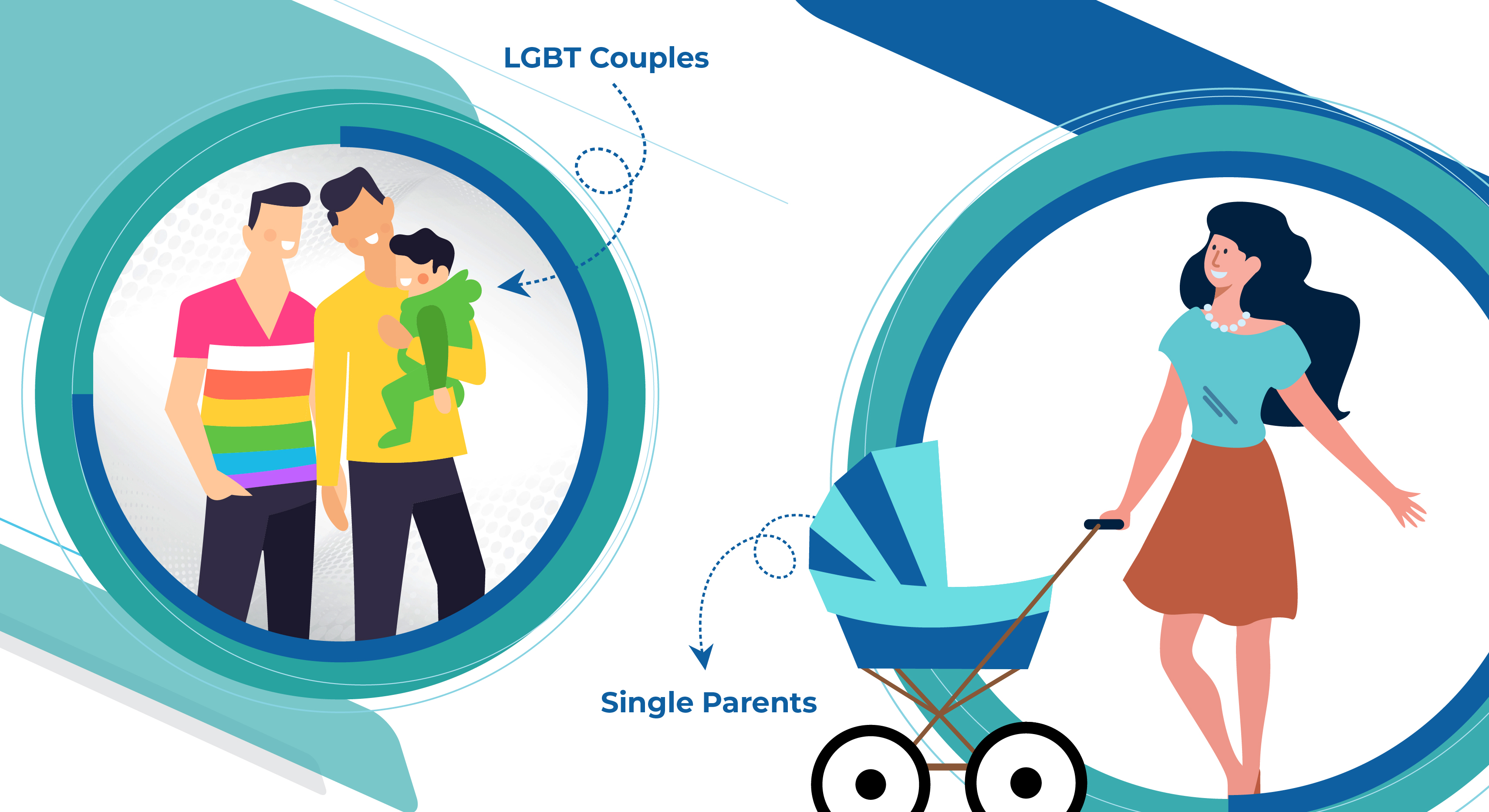It's a natural need of a living organism to procreate and also an emotional one. Humans spend a considerable amount of time to find a partner and bear children. Along with the evolutionary need, LGBTQ parenting and single parenting is also an emotional journey that every human wants to feel. For heterosexual couples, infertility is an obstacle. Still, for LGBT and people who wish to live a single life, they can surely not conceive or have children through traditional ways. LGBT couples and singles with compliance with legal laws in their respective country can bear children through Artificial Reproductive Technology (ART).
Adoption is also an option, but individuals and couples are more inclined towards genetic offsprings. There's no medical hurdle in child options for LGBT couples and singles. Still, there can be logistical issues, legal difficulties, and financial obstacles that heterosexual couples rarely consider or need to deal with.
Another important aspect of this is that LGBT couples and singles can even face situational infertility. Situational infertility is that whether one has legal compliance to have children without a partner or with their particular partner. People from the LGBT network, especially transgender, can be experiencing from sterility or diminished fertility.
With all this being covered, let's move forward with this article of 'Parental Journey Of LGBT Couples And Single Parents!' We have mentioned various ART processes through which one can bear genetic offspring. Individuals from LGBTQ parenting or single shouldn't feel awkward about deciding to have a baby unless they have gone through and are well prepared for legal compliance and financial requirements. Below are the options through which you can welcome parenthood in your life:
Sperm Donor
This is common for single women, lesbian couples, and other LGBT couples who don't have a partner to provide sperm. The sperm is retrieved from the donor, and the egg from the decided female member from the couple is obtained. Through IVF (In Vitro Fertilization), in which sperm and eggs are fertilized outside the human body in a petri dish, the conception is realized. Then the fertilized egg is planted in the decided female from the couple. For a lesbian couple, one female member can provide an egg, and another can carry the pregnancy. This isn't done for any medical benefit but the emotional satisfaction of the two females.
There can be various types of donors, as well.
- Anonymous Donors- In this setup, the woman or couple doesn't have the donor's identity. Many couples or women prefer to have anonymous donors to eliminate the donor's possibility of prosecuting them for right over the child. The clinic shall maintain the donor's records as once the child has attained the legal age, he/she can demand to know their genetic father. Note: As per the clinic rules and parent's curiosity, some information that does not reveal identity can be communicated to the parents. Adding on to that, the donor has the equal will to remain anonymous as the parent's choice.
- Known Donor- They can be someone from family, friends, or the donor must have been friends with the woman/couple for this purpose. The clinic doesn't need to hide the identity most of the time, and it is the woman or couple who brings the family member/friend with them. The known donors have currently been more sought as women, and couples prefer to have sperm from the individuals whose background, genetic lineage, and other necessary information are known to them. Having a known donor seems to give surety to the woman and couple. Otherwise, it has no medical aspect.
Irrespective of the donor type, after retrieving the semen, doctors perform sperm washing and analyze the sperm to ensure their quality. If the woman or the couple is planning to have a pregnancy in the later stage of life, then the eggs of either partner can be frozen as a method to be saved from infertility. This is known as cryopreservation.
In some cases, single men, gay couples, or other LGBT couples with male infertility can have the option of a sperm donor, egg donor, and surrogate mother. But such people than usually move towards adoption only.
Egg Donor and Surrogacy
Surrogacy is an arrangement in which the fertilized egg is planted in a woman as the couple or single man can't carry out the pregnancy. Single men, the gay couple use this, and the other LGBT parenting with no partner to provide eggs or sustain a pregnancy. This sect undoubtedly requires a female to give eggs and also sustain the pregnancy. Often the surrogate mother's egg is used, rarely a man or couple asks the doctor to use a different egg other than a surrogate mother.
Likewise, in the above case, the surrogate mother and the donor can remain anonymous or known. The child born in this case can share the identity of the mother after attaining the legal age. Terms of such arrangements are advised to be contracted. The surrogate mother has the right to demand compensation for all treatments, check-ups, and facilities related to pregnancy, even post-pregnancy if any issue is related to the previous pregnancy, the couple or the man can be liable to compensate. In the case of an anonymous surrogate mother, the clinic is bound to mediate all such issues. If more than one egg is fertilized, then the man or the couple can choose to freeze, donate, or destroy it.
Upon choice, the single women, lesbian couple, or other couples from the above point can have an egg donor and surrogate mother, or just an egg donor.
Embryo Donor And Surrogacy
As the name is self-explanatory, this means having an embryo donor with or without surrogacy. This option can be taken by single women, single men, and LGBT couples. But it is uncommon to have a donated embryo and surrogacy, couples who have to do this prefer adoption. The single women, lesbian couples, and other LGBT couples with proper female reproductive tracts to sustain pregnancy but aren't able to release quality eggs can demand an embryo. Usually, the donated embryo comes from the stored backups by previous IVF couples. Rarely, someone has a family, friend, or known to donate both sperm and eggs, for having a fresh embryo. This is why embryo donors remain anonymous individuals.
Surrogacy In Detail
In the above points, for almost every option, surrogacy is available. Surrogacy is an arrangement (can be legal), whereby a woman who is called a surrogate mother agrees to bear the child for another person or a couple. She may or may not have any right (as per contract) over the child after it's born, but she shall be paid for all the expenses related to pregnancy till the childbirth and some post-pregnancy treatments too. The surrogate mother can be anonymous, family member, friend, or a known woman. In the case of an anonymous surrogate mother, all the legal requirement and communication has to be mediated by a reliable mediator (often the IVF clinic/doctor).
The surrogate mother also has to pass a necessary test before the conception takes place. The conception will take place with the help of IVF (In Vitro Fertilization), IUI (Intrauterine Insemination), or any other ART (Artificial Reproductive Technology). The fertilized egg planted in her embryo is of the couple's or individual's sperm and/or eggs or donor sperms and/or eggs. Surrogacy has different legal laws in different countries. So the couple/individual should be first aware of the legal surrogacy laws in their country and the country in which they are planning surrogacy.
So now, you are aware of the parental journey of single men, single women, and LGBT+ couples and a genetic child. Adoption is always an option too. We have mentioned that single men, single women, and LGBT+ couples have to be sure and go through all the laws regarding their marriage, children, surrogacy, adoption, and other related issues. These laws profoundly differ from country to country; apart from their home country, if they are looking for treatment in other countries, then it is advisable to go through the legal process of that country too. Femicure always wishes all the individuals a happy and healthy life. We also work with international patients and assist them with all general and treatment services they require. The same goes for treatment seekers who'll be visiting different cities or states for the treatment.



 IVF Centers
IVF Centers IVF Doctors
IVF Doctors Joint Replacement
Joint Replacement Spine Surgeries
Spine Surgeries Dental
Dental Slimming/Weight Loss Clinics
Slimming/Weight Loss Clinics Hair Transplant Clinics
Hair Transplant Clinics Physiotherapy clinics
Physiotherapy clinics
 Search
Search





